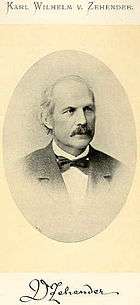Carl Wilhelm von Zehender

Carl Wilhelm von Zehender (May 21, 1819 – December 19, 1916) was a German ophthalmologist born in Bremen.
He studied medicine at the universities of Göttingen, Jena and Kiel, receiving his doctorate in 1845. He studied ophthalmology in Paris as a pupil of Louis-Auguste Desmarres, then furthered his education in Prague, Vienna and Berlin. He worked at an ophthalmic practice in Neustrelitz, and in 1862 was named a professor of ophthalmology at the University of Bern. From 1866 to 1889 he was a professor of ophthalmology at the University of Rostock (rector 1875/76), then afterwards he relocated to Munich, where he remained until 1907. He died in Rostock in 1916 at the age of 97.[1][2][3]
Zehender is considered a pioneer of ophthalmic microsurgery, as in 1886 he introduced the practice of using a compound binocular vision instrument for ophthalmologic examination.[4]
He was a founder and editor (1863-1899) of the ophthalmic journal Klinische Monatsblaetter fur Augenheilkunde, and was instrumental in the creation of the Heidelberger Ophthalmologische Gesellschaft, which was predecessor to the Deutsche Ophthalmologische Gesellschaft.
References
- NCBI Biography of Carl Zehender
- ↑ The Genealogy of Ophthalmic Teaching in Switzerland
- ↑ The American Encyclopedia and Dictionary of Ophthalmology, Volume 18 edited by Casey Albert Wood
- ↑ Zehender, Karl Wilhelm von Catalogus Professorum Rostochiensium
- ↑ Neurosurgical Classics II - Google Books Result